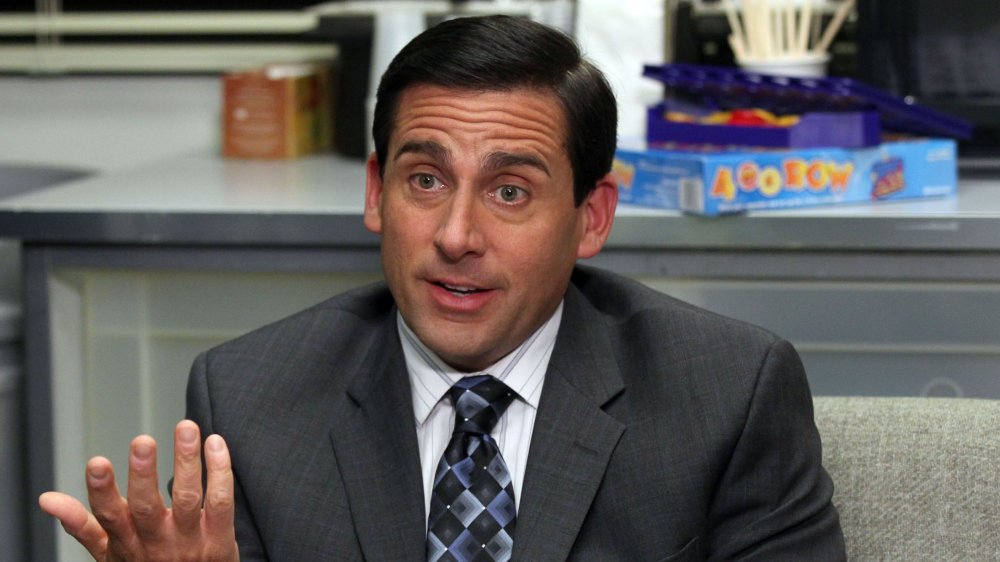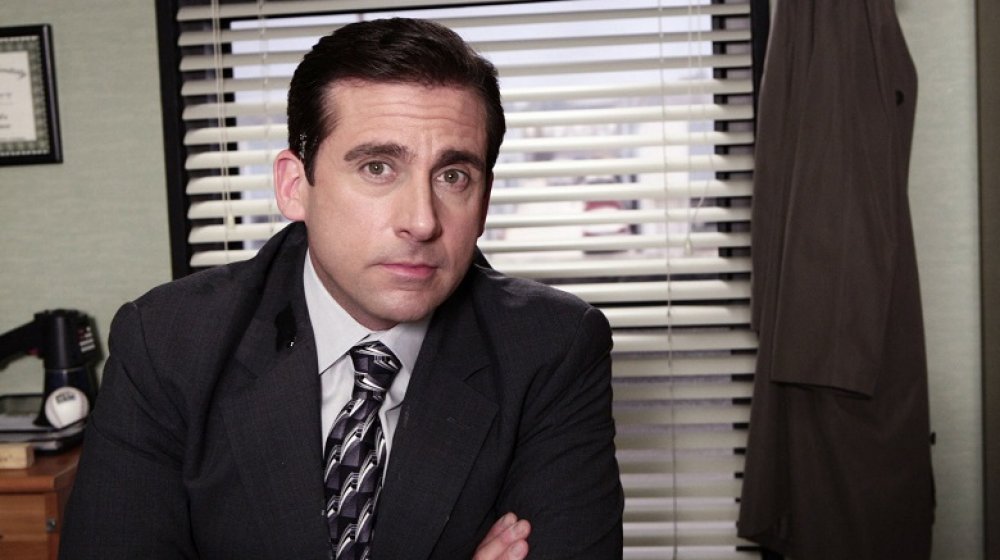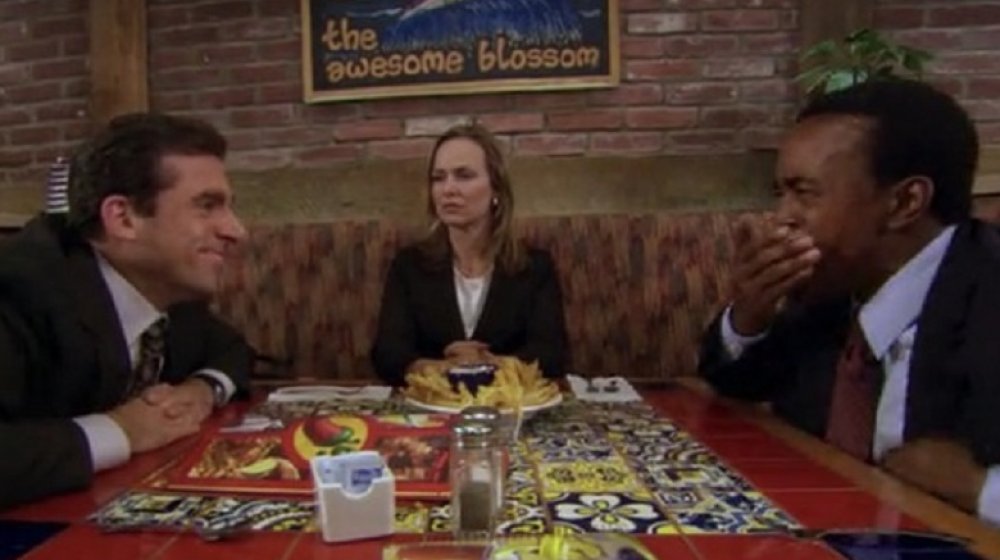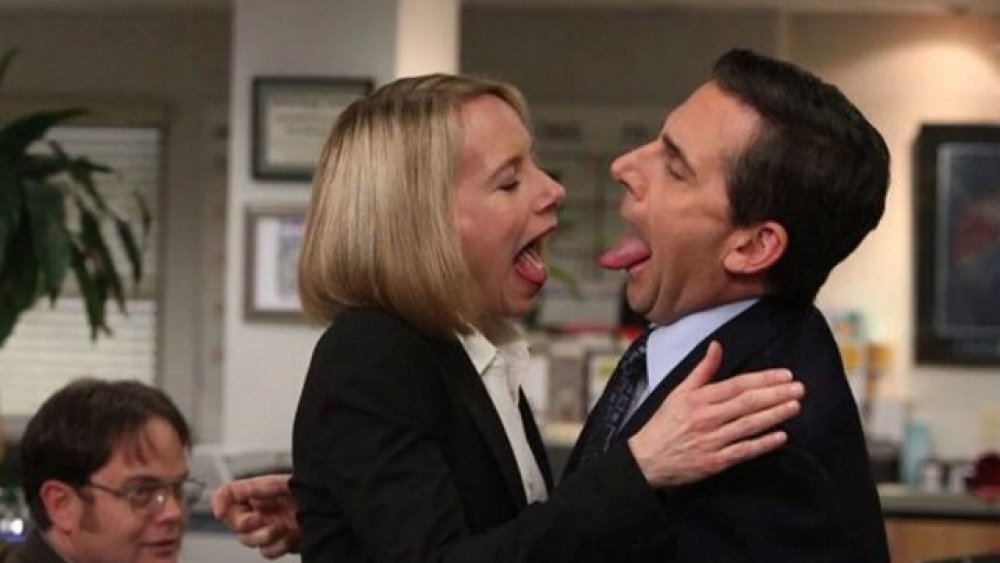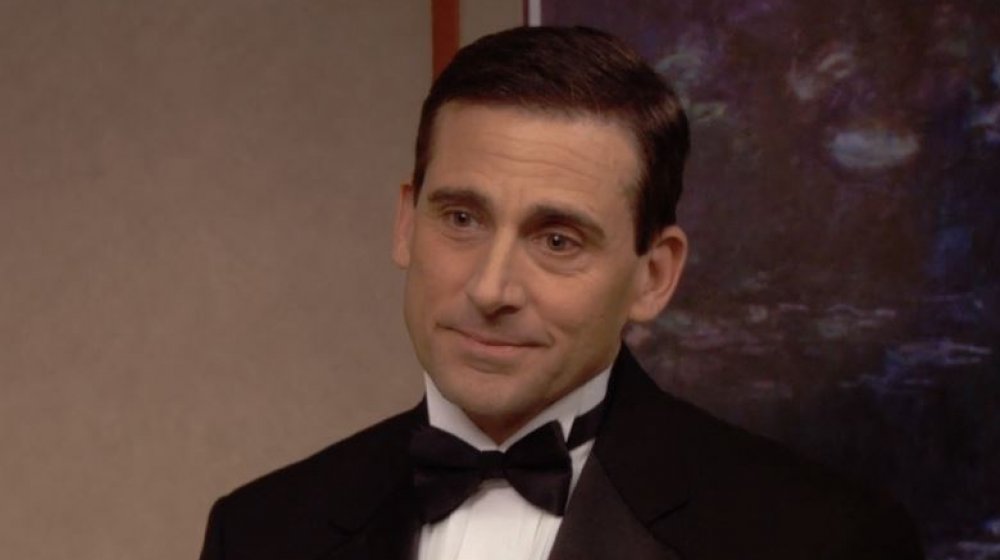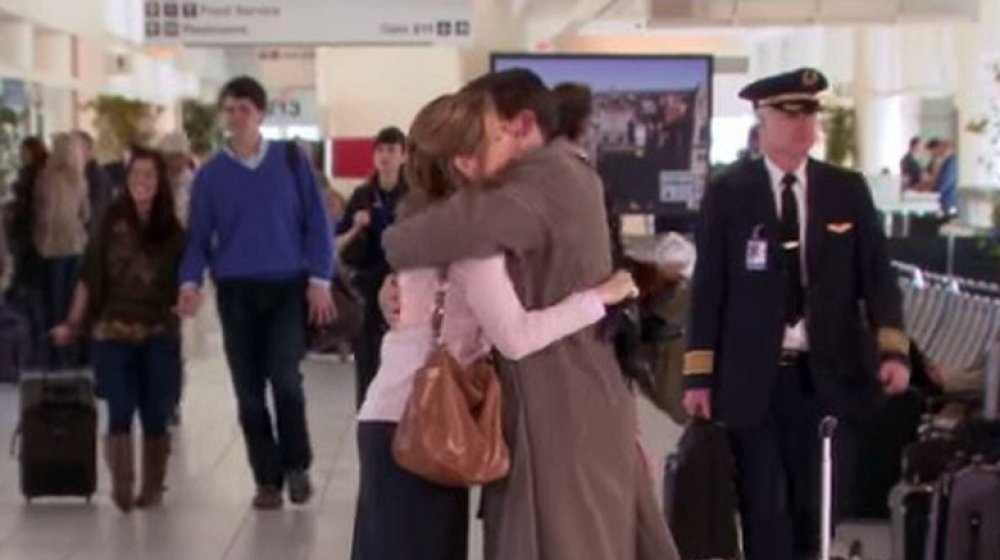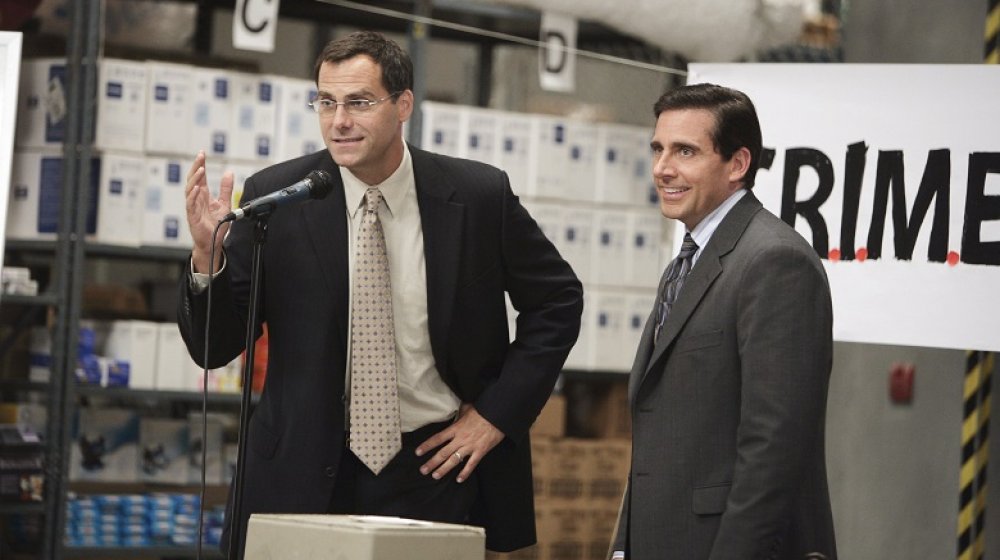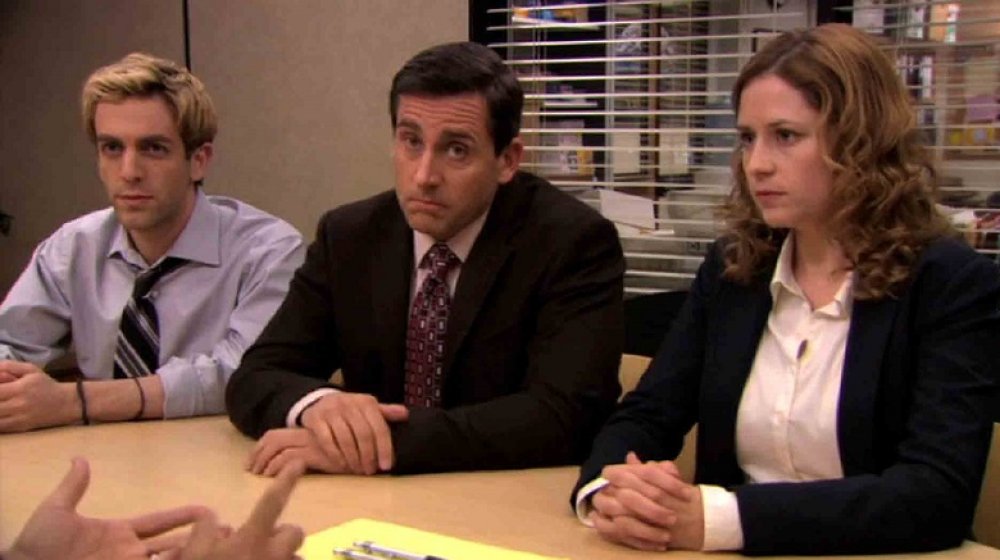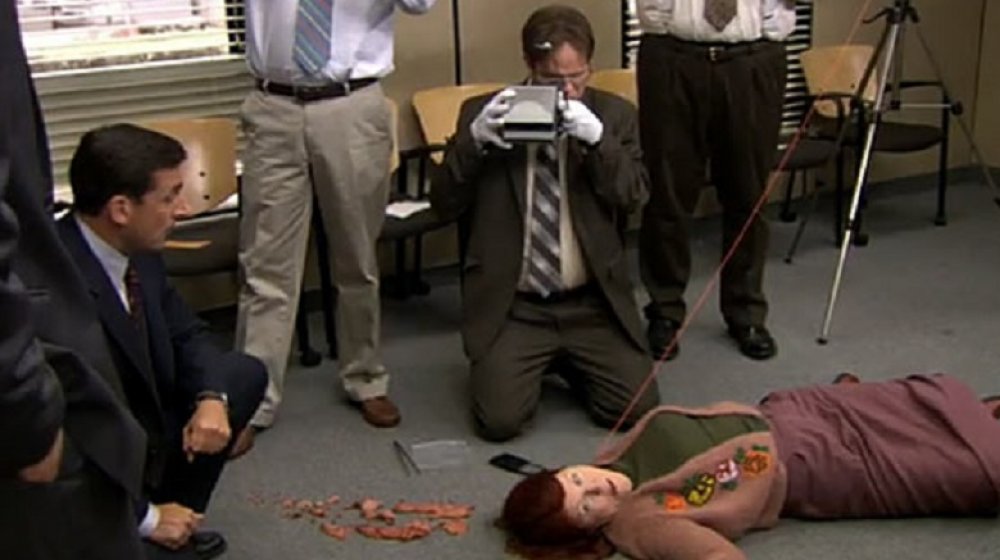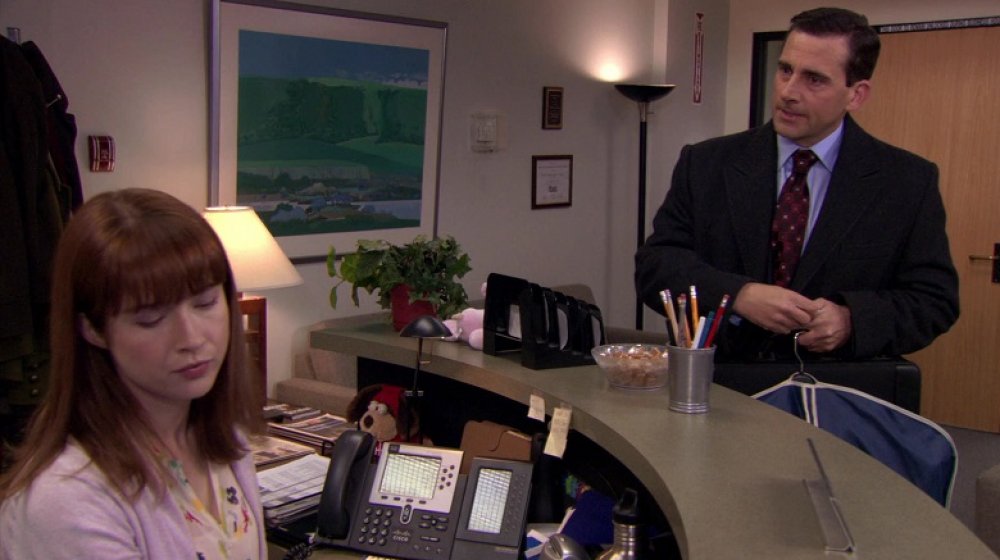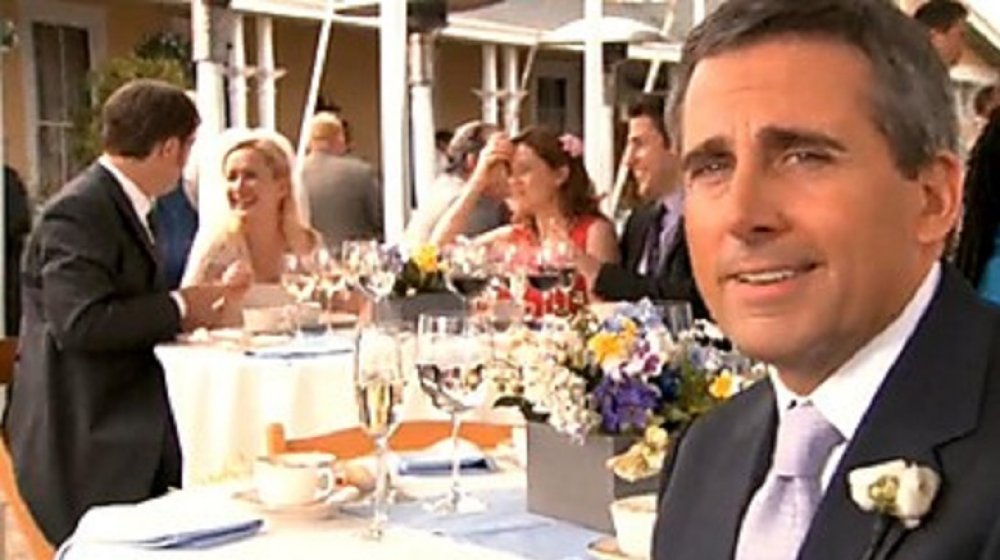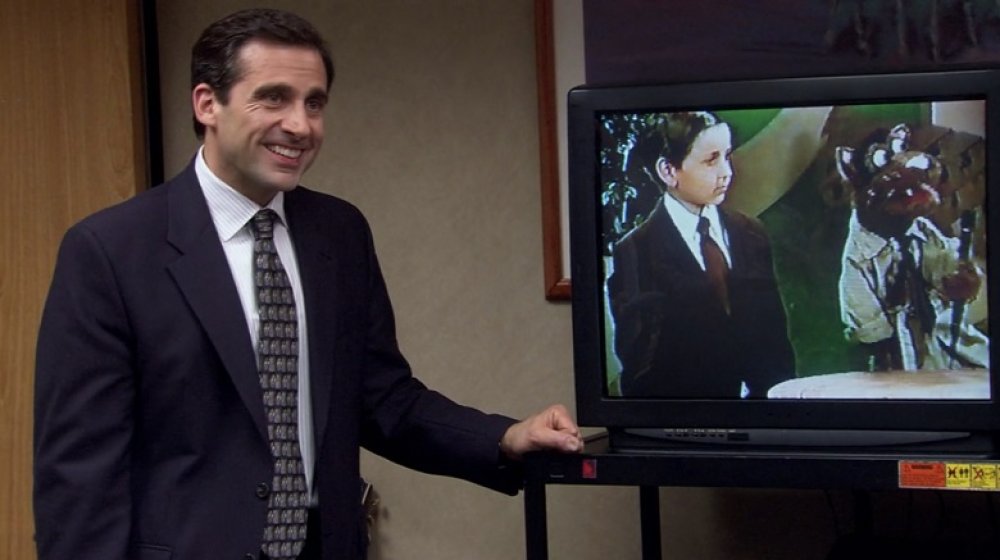Michael Scott's Biggest Changes Between Season 1 And Season 7 Of The Office
The first season of The Office was only six episodes long, and it was much closer in spirit to its original British counterpart than it was to the show it would eventually become over the next eight seasons. Nowhere is that more evident in the character of Michael Scott, played by Steve Carell, the buffoonish man-child who managed the Scranton office of the Dunder-Mifflin paper company. In the U.K. show, Ricky Gervais played Office manager David Brent as an incompetent, narcissistic, and sometimes cruel man who was more to be endured and mocked than anything else.
Michael Scott started out with many of the same traits. Showing off for the cameras that documented the goings-on at Dunder-Mifflin, he was often cruel and petty in his attempts at "humor." He was cluelessly racist and insensitive. He abused his power to suit his childish whims. He was self-deluded as to how others saw him, thinking of himself as the world's funniest boss. His lack of decisiveness was just one of the factors that made him a terrible manager, especially when he sought to blame others for his own mistakes. He was spectacularly incompetent with the opposite sex, veering between blatant misogyny to simple insecurity.
Starting with the second season, however, his character started evolving to make him more likable and competent without sacrificing his core insecurities. Like many of the other characters on the show, he eventually became his best self. Let's take a look at how it happened.
Michael Scott's makeover
Michael Scott started out looking a lot like David Brent. He was a sloppy, sleazy-looking schlub. His hair was slicked back like Brent's, and he wore ill-fitting dress shirts with the sleeves sometimes rolled up. The summer before the second season of the office, Steve Carell starred in the movie that ended up serving as his career breakout, The 40-Year-Old Virgin. He slimmed down for the role, and showrunner Greg Daniels also took the advice of series creators Ricky Gervais and Stephen Merchant: if you want the show to last, you have to make Michael Scott more likable. They leaned into his new physique to alter his overall appearance.
As a result, Michael Scott started wearing more expensive suits that were properly fitted. He stopped slicking back his hair. He toned way back on the overtly sleazy body language. While he was still frequently obnoxious and oblivious, one could start to see him as not only being more likable but also much more attractive. It all started with a makeover that was retconned back into childhood when we learned that he liked to wear suits as a child.
Bad manager, great salesman
David Brent was portrayed as completely incompetent, but Michael Scott had to show some reason why he was promoted to manager, even if he was often terrible at that job. As first portrayed in "The Client," Michael had a way of reaching customers through his genuine desire to want to be friends with them. His warmth was real, even if he was trying to make a sale. He landed a huge buy during that episode at a Chili's, after making a series of ridiculous and slightly off-color jokes.
Scott's toady Dwight Schrute noted that Michael won awards for Best Salesman before he was a manager. Michael revealed that he kept a Rolodex of all of his clients with a few keywords that helped him remember things about their lives and their interests that he could zoom in on. In "Two Weeks" and "The Michael Scott Paper Company," Michael quits Dunder-Mifflin and quickly takes a number of its clients with him.
The narrative that Michael became manager because he was really good at one aspect of the job makes sense. However, the tactics he used to become a great salesman (his ingratiating manner and his joking persona) made him a mess as a manager. Even there, he wasn't portrayed as badly as some of the other branch managers. In "Valentine's Day," when he goes to New York to do a presentation on Scranton, he's far more prepared than the Albany branch manager Craig.
Michael gets a love life
In season one of The Office, Michael was depicted as being both sleazy and utterly inept with women. This was spotlighted in "Hot Girl," when Michael allowed an attractive purse salesman named Katy to set up shop despite solicitors usually being frowned upon. His attempts to hit on her were hilariously transparent, yet he was stunned when Katy decided to get a ride with Jim Halpert at day's end.
In season two, Michael's boss Jan Levinson was so impressed with Michael making a key sale in "The Client" that she impulsively hooked up with him. Though she said it should just be a one-time thing, they later had a tumultuous relationship. Michael also dated his real estate agent Carol and demonstrated that he was way too desperate, as he asked her to marry him publicly after just a few weeks. Later, she broke up with him when he photoshopped himself over her ex-husband's photo on a family skiing trip and sent it as a Christmas card.
While Michael later dated other women, the love of his life proved to be Holly Flax. A woman every bit as quirky as him, she replaced Toby as HR director, and Michael did everything right in courting her. He avoided the crude comments and instead kept her laughing. Even when she left for another branch, they eventually got back together. He left Scranton to be with her as she took care of her parents, and they had four kids.
From contempt to admiration
Other than Dwight, whose fawning admiration for Michael was partly motivated by his desire to take his spot, the other members of Dunder-Mifflin either barely tolerated or outright despised Michael. Ironically, the only other exception to this was Human Resources director Toby Flenderson, who pitied Michael despite his boss' utter loathing for dampening his "fun" ideas.
Kelly Kapoor slapped him in the face in season one's "Diversity Day" for using a racist accent when talking to her. Stanley Hudson mostly ignored Michael's inane antics as he would work on his crossword puzzle during silly conference room meetings, but that came to a head in season four's "Did I Stutter?" When Michael pestered Stanley one time too many, Stanley yelled at him and refused to apologize because he did not respect him. Michael had to force him to agree to not speak to him disrespectfully in public.
Over time, the members of the office came to respect Michael more, especially after he briefly left the company. Even Jim admitted that he would never be as good a salesman as Michael was in "Koi Pond." When Michael was set to leave Dunder-Mifflin to go off with Holly in "Michael's Last Dundies," his employees sang him a version of "Seasons of Love" (from Rent) modified for him. It was a powerful emotional moment, made more so because Steve Carell didn't know it was coming.
A devoted friend
Michael viewed the members of the office as his friends and family, even if they didn't reciprocate. One reason why: he abused his authority to make people play along during meetings. Friendship for him was being the center of attention, not caring for others.
That slowly changed over time. In season two's "Business School," he was the only member of the office to show up to Pam Beesly's art show and show enthusiasm about her work. Oscar Nunez showed up with his partner, but he secretly made snarky comments that Pam overheard. Michael was not only genuinely impressed by her art, he bought one of her pieces to hang up in the office. The hug she gave him was emotional, as she desperately needed validation.
In "The Convention," Jim assured Michael that leaving Scranton for Stamford had nothing to do with him, and even introduced him as his former boss and current friend.
When Michael snuck away from the office in "Goodbye Michael," Pam tracked him down at the airport and gave him a hug. They exchanged words off-microphone in what's become one of the most famous moments from the show, poignantly highlighting how far both characters had come.
Finding his self-esteem
Michael didn't start off with a lot of self-esteem. All of his self-aggrandizement masked a fragile ego that would lash out at any perceived slight. In season one's "Basketball," for example, he throws a tantrum when he realizes that he can't hang with people on the court. He deals with his own superiors with a mix of deference and fear, even as he finds himself attracted to Jan.
One of the things that boosts his self-esteem is the fact that after the Scranton office is almost dissolved, it bounces back to become Dunder-Mifflin's top sales branch. For a while, CFO David Wallace wonders what he's doing right, despite his unconventional style of management. Then he concludes that the branch is succeeding despite Michael, and sends a corporate supervisor named Charles Miner to hound him in season five's "New Boss." Miner overrules everything Michael does, include trying to plan his 15th-anniversary party with the company.
An incensed Michael drives to New York to confront Wallace after he ducks his calls. When Wallace promises that Michael can have his party and that he will attend, Michael realizes he's just being humored. He quits on the spot and forms his own paper company, taking Dunder-Mifflin on directly, then manages to bluff his way back into his old job when Wallace sees that Scranton is bleeding money. His belief in himself also saves Pam and Ryan's jobs.
More self-awareness
In the early years, Michael was unaware of his flaws. He was unaware that he even had any, other than maybe being too much fun. However, he was humbled over the years. He realized his homophobia had hurt Oscar, for example, in season three's "Gay Witch Hunt." He realized that he was bad with money, especially since he couldn't say no to Jan's spending, resulting in his needing to declare bankruptcy (by yelling out "I declare bankruptcy!") in season four's "Money."
In season five's "Broke," however, Michael is well aware that he is incapable of keeping a secret. In this case, it's the fact that his new Michael Scott Paper Company is losing money and won't last another day. He begs Pam and Ryan to keep him reined in when he confronts David Wallace to buy out the company. To everyone's surprise, he's not only able to keep the secret from Wallace, who's desperate to stop clients from jumping away from Scranton, but keep his cool as he negotiates getting his old job back. He threatens to keep forming new paper companies no matter what, and Wallace takes him seriously. Michael's awareness of his flaws allowed him to master it when he really had to.
From narcissism to empathy
In season one of The Office, Michael was portrayed as a narcissist who was unable to understand the feelings of others. In his zeal to be a "performer," he ignored how often his hacky jokes and voices were hurtful. It was clear that some of that came from imitating the behavior of his "friend" Todd Packer, a true sexist, racist narcissist who ran roughshod over everyone. Michael worked with him as a salesman and clearly thought of him as some kind of masculine ideal.
As he grew more secure in himself, the gentler side of Michael's personality came out more — the one that wanted to make actual friends instead of simply getting attention. In "Murder," for example, Michael and Jim were co-managers of the Scranton office when they learned that Dunder-Mifflin was heading toward bankruptcy. Michael insisted that the office play a murder-mystery game as a distraction from the bad news that was filtering in. Jim was too focused on productivity to see that what they needed was to not think about bad news.
Contrast that to season three's "Branch Closing," when Michael immediately blurted out "We are screwed!" to the office when it seemed like the Scranton branch was going to be absorbed by Stamford. Though he jumped in his car and tried to "save" the branch by driving to David Wallace's house, it was akin to a chicken without a head.
Michael Scott, father figure
One of the most unexpected but sweetest relationships in The Office was the one between Michael and Erin Hannon, the young woman who replaced Pam as the receptionist. Unlike Pam, Erin totally and enthusiastically loved Michael's performances and jokes. Michael always went for approval from those who withheld it the most from him, so he initially treated Erin with the kind of contempt he often held for Dwight.
However, she won him over in time. Both of them had the personalities and senses of humor of children, so they bonded over silly jokes and off-color puns. In season seven's "Viewing Party," Erin invited Michael over to a Glee viewing party so he could bond with her boyfriend Gabe Lewis. Gabe worked for Sabre, the corporation that acquired Dunder-Mifflin after it went bankrupt, and Michael was jealous that people looked to him as the "real" boss. So he repeatedly refused Erin's efforts until she confronted him about it.
Michael was clueless that it mattered to her because she viewed him as a father figure. When he figured it out, he said "go to your room, young lady!" in an effort to play along. Erin had grown up in foster care and thus never had any parental figures to lean on, and Michael promised to always be there for her even when he left. Erin became fiercely loyal and protective of him as a result of his empathy.
From cruelty to kindness
The Michael Scott of the first season was often simply cruel. In a replay of the British Office's pilot, the US pilot saw Michael Scott bring Pam into his office in order to fake-fire her. Considering that talk of layoffs was already in the air, this prank was especially thoughtless. The fact that he did it in front of new hire Ryan Howard and the documentary film crew made it sadistic. The clueless Michael knew that he had stepped over a line, but didn't know what to do.
When Dwight married Angela in "Finale," Jim was originally going to be Dwight's best man. Instead, Michael showed up for his old friend when he needed him the most. Michael put aside their past conflicts on his last day of work and wrote him the letter of recommendation that he knew Dwight wanted. He rehired Ryan Howard despite Ryan treating him with contempt when he went to corporate and then was arrested for fraud. He was even... not mean to his imagined arch-nemesis Toby in "Goodbye Michael!"
The pathos of Michael Scott
Another key change to Michael's character is that more elements of his past were revealed as the series went on, revealing him to be a figure more to be pitied than openly despised. While he started off simply as a character who tried to emulate the toxic masculinity of Todd Packer, it was eventually revealed that the essential Michael Scott emotion was loneliness. He grew up without friends, and there's a heartbreaking moment in "Take Your Daughter To Work Day" when he shows kids visiting the office footage of him as a kid saying his dream is to "get married and have 100 kids, so I can have 100 friends, and no one can say 'no' to being my friend."
Toby knew Michael had never processed the trauma of his childhood, the fact that he hated his stepfather, and that he had a half-sister from whom he was estranged for over a decade. That's why he put up with his abuse; indeed, Toby's greatest quality was serving as a sounding board for the office's petty gripes.
The fact that Michael actually worked through a lot of these issues and was able to genuinely develop actual friendships with many of his coworkers and build a life with Holly Flax is one of the key emotional narrative arcs of the entire series. While Michael still didn't have a great filter and was often inappropriate, there was mutual warmth between him and the office.
